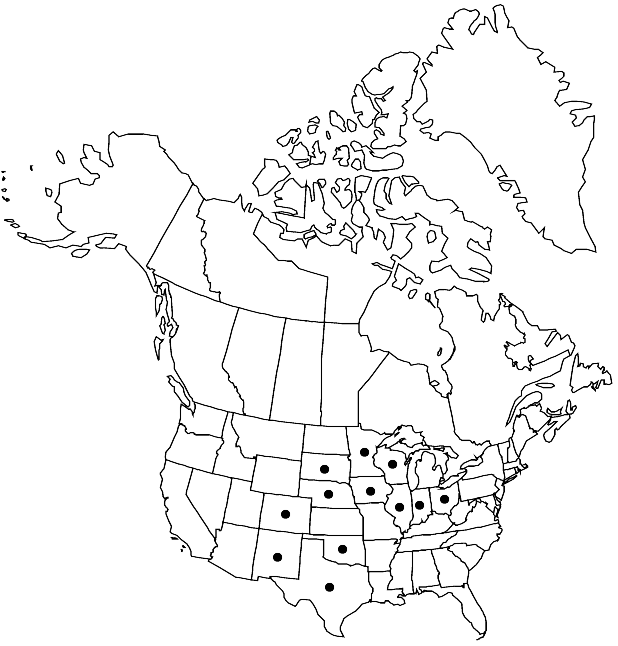Polanisia jamesii
Brittonia 10: 54. 1958.
Annuals, 15–40(–60) cm. Stems branched; hairs stalked, glandular throughout. Leaves: petiole green to purple, angled, (0.2–)0.5–0.8(–1) cm; leaflet blade linear to narrowly elliptic, 1.5–2.8 × 0.1–0.2 cm, margins entire, apex acute, mucronulate, surfaces densely glandular abaxially, sparsely glandular adaxially. Racemes 1–3 cm (6–8 cm in fruit); bracts trifoliate, ovate, 5–15 mm. Pedicels 5–15 mm. Flowers: sepals pale yellow, glandular, lanceolate, 1.6–2.6 × 0.8–1.2 mm, margins entire, apex acute to obtuse; petals white, oblong-ovate, clawed, abaxial pair 1.5–3 × 1–2 mm (6 or 7-lobed), apex emarginate to lacerate, adaxial pair 3–5 × 2–3 mm (4 or 5-lobed), apex emarginate to lacerate; nectary glands yellow (drying purple), 0.5–1 mm; stamens 6–9, slightly exserted, yellow, 3.2–5.2 mm; anthers yellow, 0.5–1 mm; gynophore 2–4 mm in fruit; ovary 2.5–5(–7) mm; style persistent in fruit, 2.5–4.5 mm; stigma red. Capsules 8–30 × 2–4 mm, reticulate, glandular. Seeds 18–36, bright reddish brown, globose to oblong, 1.8–2 mm, pebbled (without transverse ridges). 2n = 20.
Phenology: Flowering summer–early fall.
Habitat: Sandy soil, often in blowouts in prairies and stabilized dunes
Elevation: 200-1400 m
Distribution

Colo., Ill., Ind., Iowa, Minn., Nebr., N.Mex., Ohio, Okla., S.Dak., Tex., Wis.
Discussion
Of conservation concern.
Populations of Polanisia jamesii in Indiana and Ohio are adventive.
Selected References
None.